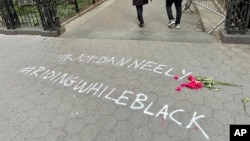More than two weeks after Jordan Neely, a 30-year-old mentally ill and homeless Black man was choked to death on the New York City subway by a former Marine, reaction to the killing has broken down along familiar political fault lines.
Daniel Penny, the 24-year-old man who placed Neely in a chokehold and was captured on video holding him for several minutes, is being widely hailed as a hero by Republican politicians in the United States, and a fund set up for his legal defense has collected more than $2.5 million and continues growing.
Many Democrats, by contrast, have argued that choking Neely to death was a criminal act that should be punished. In the eyes of many, it evoked the death of George Floyd, the Black Minneapolis man whose 2020 choking death at the hands of a white police officer was also captured on video, and energized the Black Lives Matter movement.
Penny was released in the immediate aftermath of the subway killing. Ten days later, the Manhattan district attorney charged him with second-degree manslaughter, a crime that carries a maximum sentence of 15 years in prison.
Known facts
Neely's killing first came to the public's notice via a cellphone recording made by a fellow passenger in the minutes before his death. When the video begins, Penny and Neely are already on the floor of the subway car, with Penny's left arm around Neely's throat. Two other men are attempting to restrain Neely's arms and legs.
Penny holds him in the chokehold for several minutes as the movement of Neely's arms and legs become feebler. At one point, another passenger warns Penny that he appears to be killing Neely. Several minutes into the video, when Penny releases Neely, the latter remains on the ground, unmoving.
Witnesses told police that in the moments before Penny placed Neely in the chokehold, Neely had been behaving erratically. He was reportedly screaming at other passengers, telling them he was hungry and thirsty and that he was ready to die.
Prosecutors said that in advance of Penny placing him in a chokehold, "Several witnesses observed Mr. Neely making threats and scaring passengers."
However, there has been no claim that Neely actually harmed or attempted to harm anyone.
Republican reaction
In the days after Neely's death, public reaction rapidly fractured along political lines, with conservatives praising Penny as a hero, and liberals condemning him as a vigilante.
One of Penny's most vocal supporters has been Florida Governor Ron DeSantis, who is widely expected to seek the Republican presidential nomination in 2024. DeSantis last week used his Twitter account to support Penny and attack Manhattan District Attorney Alvin Bragg, claiming the latter is funded by billionaire George Soros, long a detested target of the conservative movement who contributes to liberal causes and Democratic campaigns.
"We must defeat the Soros-Funded DAs, stop the Left's pro-criminal agenda, and take back the streets for law abiding citizens. We stand with Good Samaritans like Daniel Penny. Let's show this Marine ... America's got his back," DeSantis wrote.
Nikki Haley, a declared candidate for the GOP nomination, said on Fox News Tuesday night that New York Governor Kathy Hocul should intervene in the case and pardon Penny.
"If she pardons him, that sets a right on a lot of things — it'll put criminals on notice," said Haley, a former governor of South Carolina who served as ambassador to the United Nations under former President Donald Trump. "And it'll let people like Penny who really were very brave in that instance, it will let them know that we've got their back."
Democratic reaction
"Black men seem to always be choked to death," said Representative Jamaal Bowman, after the killing. "Jordan Neely did not have to die. It's as simple as that. Yet we have another Black man publicly executed."
Representative Maxine Waters, a long-serving California House Democrat, wrote in an essay published by the HuffPost, "Instead of being offered compassion, [Neely] was violently murdered by a vigilante who pinned him down and … choked him to death. Others aided and abetted the murder by helping to hold him down. His offense: Being hungry and homeless."
Representative Alexandria Ocasio-Cortez, in an interview with the online publication The Cut, called Neely's death a failure of government support.
"Jordan Neely was killed by public policy. He was killed by the demonizing of the poor by many of our leaders," she said. "He was killed by the same reluctance for people to see him as human that leaders are exhibiting right now, even in his death."
Fits existing narratives
Regina Bateson, an associate professor in the Graduate School of Public and International Affairs at Canada's University of Ottawa, told VOA that the reaction to Neely's killing has broken down along partisan lines because it very clearly plays into existing frames of reference.
"This incident lines up with the core interests of two very different, but very widespread social movements that are going on in the United States at the same time," said Bateson, who has studied the political aspects of vigilantism.
"This incident lines up squarely with both the law-and-order framing that's been adopted by the right, and the concern about racial justice, excessive use of force and civil rights that's been adopted more on the left," she said.
However, Bateson said it is important to understand that examples of vigilantism are often used misleadingly to suggest that the behavior being punished is more widespread than it actually is.
Neely is being portrayed by many on the right as having presented an immediate danger to other passengers on the subway, despite there being no evidence that he actually harmed or was going to harm anyone.
"Some people's reaction to this might be to think, 'Oh, New York is a very dangerous place. Violence is rampant in public transportation there. The state isn't providing enough policing,'" she said.
"I think that really misses the subjectivity of vigilantism and the fact that people are responding to things that they see as an offense, but are not necessarily responding to the objective reality of the situation," Bateson said.








